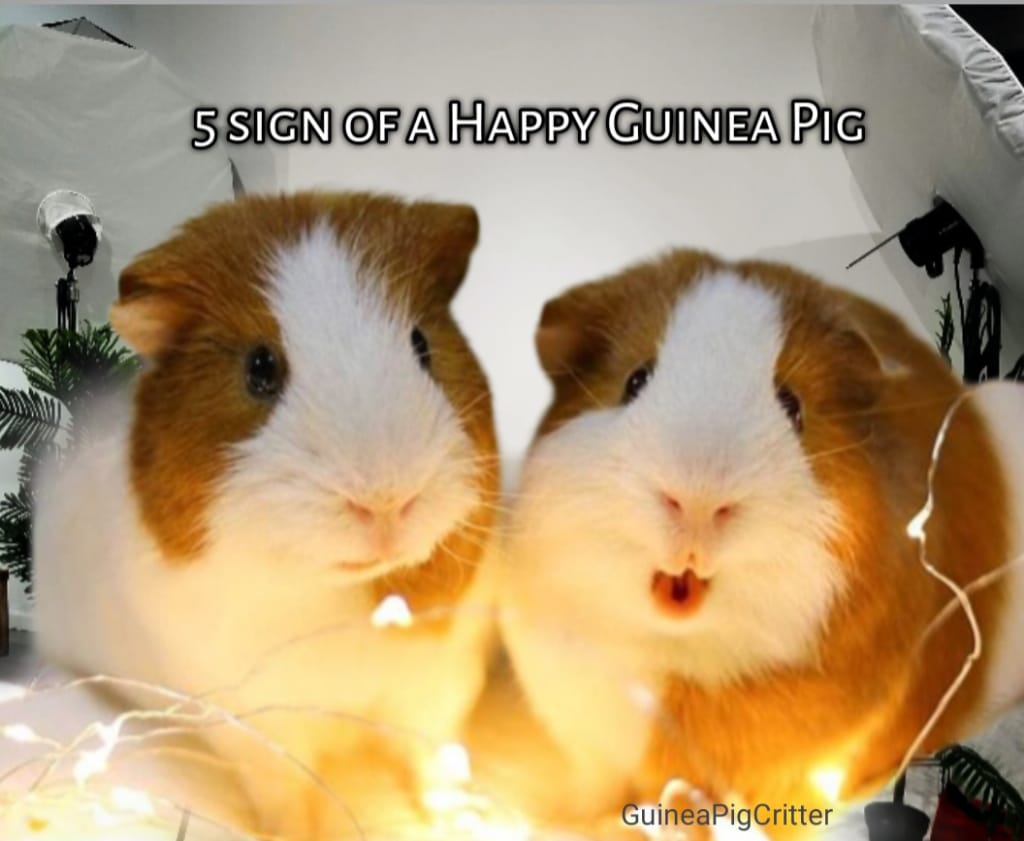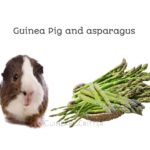Guinea pigs, or cavies, are wonderful pets renowned for their gentle and sociable character. Making sure that they feel happy and satisfied is important for their welfare and standard of life. Knowing the signs of a content guinea pig will enable you to give it better care and cement your bond with it.
In this article, we shall look at five main characteristics which show that a guinea pig is living happily and satisfactorily such as its behavior, vocal expressions, appetite and body language.
See this post :-Can guinea pigs wear Petco?
Activeness and curiosity
Being Actively Curious
Usually, an active guinea pig tends to be happy. These small animals thrive on exploration and play as they have high energy levels. It means that if your pet continuously moves around exploring different parts of the cage it feels good.
They enjoy checking out new toys or tunnels in addition to any changes made within its environment. That’s how you can know that they are interested in what’s going on around them which is crucial for both their mental health as well as physical strength.
Things To Watch Out For:
Exploration: Keep an eye out for a guinea pig that is actively exploring its cage or play area. This can include sniffing around, digging, and investigating new items. A desire to explore their environment is a good sign.
Playfulness: A joyful guinea pig will often engage in play behavior. It might run laps around its enclosure, jump and dart about, or play with toys. Another happy sign is when young guinea pigs suddenly leap up into the air for no reason at all (also known as “popcorning”).
Routine Activities: Observe whether your guinea pig engages in normal behaviors such as self-grooming, burrowing or adjusting its bedding. These routine habits show that it is comfortable and happy in the place where it stays.
How to Promote Activity:
Enrichment: Provide enough space together with enrichments. Tunnels, chew toys and hiding spots are included to arouse their curiosity as well as keep them active.
Toy Rotation: Regularly change around their toys so they stay interested and avoid boredom setting in. From time to time introduce new things into their environment.
Interaction: Spend time outside of the cage with your guinea pig allowing them to explore safe areas while interacting with you thus giving extra mental stimulation.
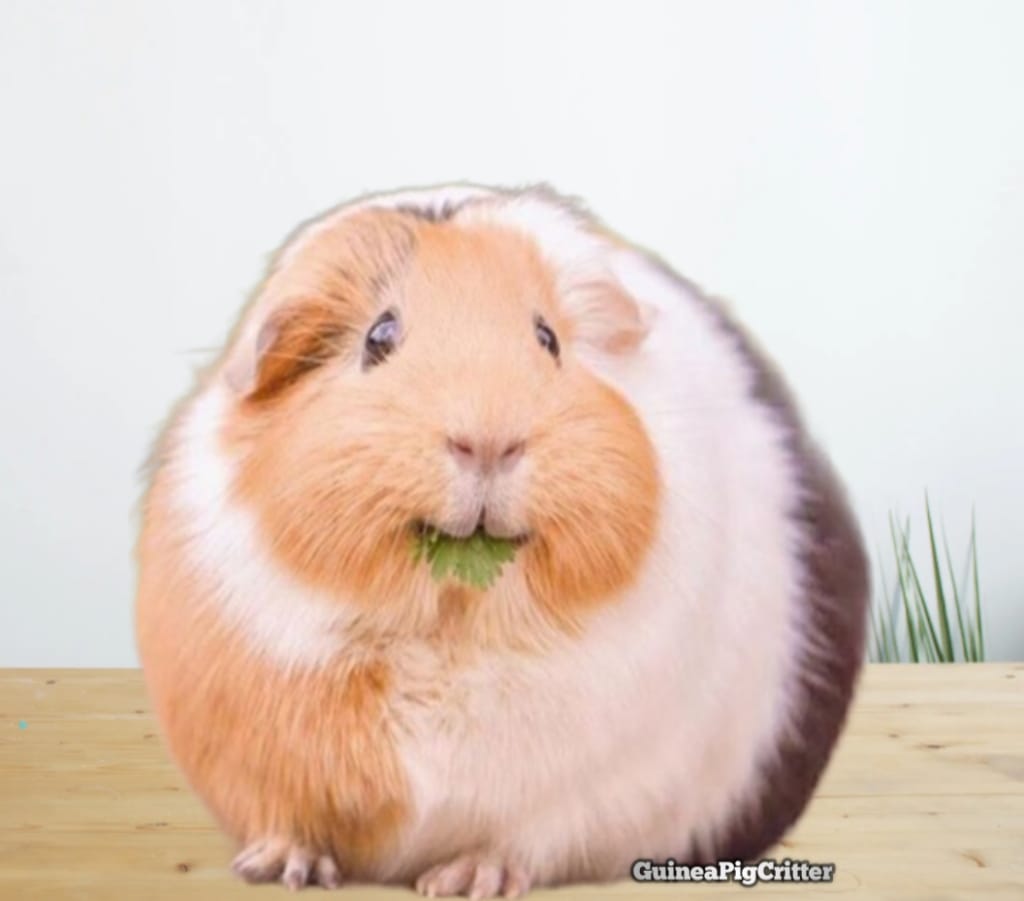
Healthy Appetite
Zestful Eating
There is a healthy appetite that guinea pigs have and this is one of the clear signs that they are happy. Guineas are generally food lovers and one that eats with passion and delight on seeing their meals is likely to be full of joy. A strong desire for eating signifies that these animals are doing fine and enjoying what they eat.
Knowing how good it is for them, feeding forms an essential part of a proper diet. To this end, their eating habits should be watched closely so as to derive important clues about their state of happiness.
Look for:
Eager Consumption: If your guinea pig eagerly runs up to its food bowl or shows excitement when you offer them fresh vegetables, this means they are happy and looking forward to mealtimes.
Consistent Feeding: A content guinea pig will eat and drink all through the day without fail. This involves regular balanced consumption of hay, vegetables and pellets without being selective or disinterested in any of them.
Balanced Diet: Ensure your guinea pig enjoys a variety of foods including hay, high quality pellets and fresh produce. For overall good health and wellness it is important for them to get a well-rounded meal.
Here are some tips to help you keep up with a good appetite:
Balanced Diet: Offer a combination of fresh hay, high-quality guinea pig pellets and different vegetables. Guinea Pigs require vitamin C rich in their diet which is found in veggies such as bell peppers and leafy greens.
Introduce New Foods Gradually: Introduce new foods gradually to make their food interesting and prevent problems with digestion. Observe how they react to these new things and adjust accordingly.
Fresh Water: Always provide fresh water that’s clean. This will keep them hydrated while ensuring they lead an active life full of happiness.
Vocal Expressions
Happy Sounds
Guinea pigs are not silent animals; the sounds they make can give you a lot of insight about what is going on emotionally with them. A happy guinea pig often makes some distinctive noises that reflect its joy and contentment. By understanding these vocalizations you can begin to understand better how your guinea pig feels so that you can learn how best to respond to its needs.
Common Happy Sounds:
Wheeling: This excited high-pitched sound is usually made when your guinea pig expects a treat or meal. It shows that she/he is eagerly waiting for her/his favorite food or your presence.
Purring: A mild, fuzzy purr usually suggests relaxation and pleasure. If your guinea pig purrs for you when being pet or carried, it means that he is comfortable and enjoying the interaction.
Chirping: Though less common, some guinea pigs produce a chirping sound when they are deeply relaxed or content. It’s a gentle, melodic noise that can be soothing and a sign of overall happiness.
Tips on How to Promote Positive Vocalizations:
Talk to Your Guinea Pig: Regularly talking to your guinea pig helps them become familiar with your voice and can stimulate positive vocalizations.
Respond to Their Sounds: Pay attention to their vocalizations and respond with affection or treats. Positive reinforcement can encourage happier sounds.
Create a Calm Environment: A peaceful, stress-free environment promotes relaxation and contentment, leading to more positive vocal expressions.
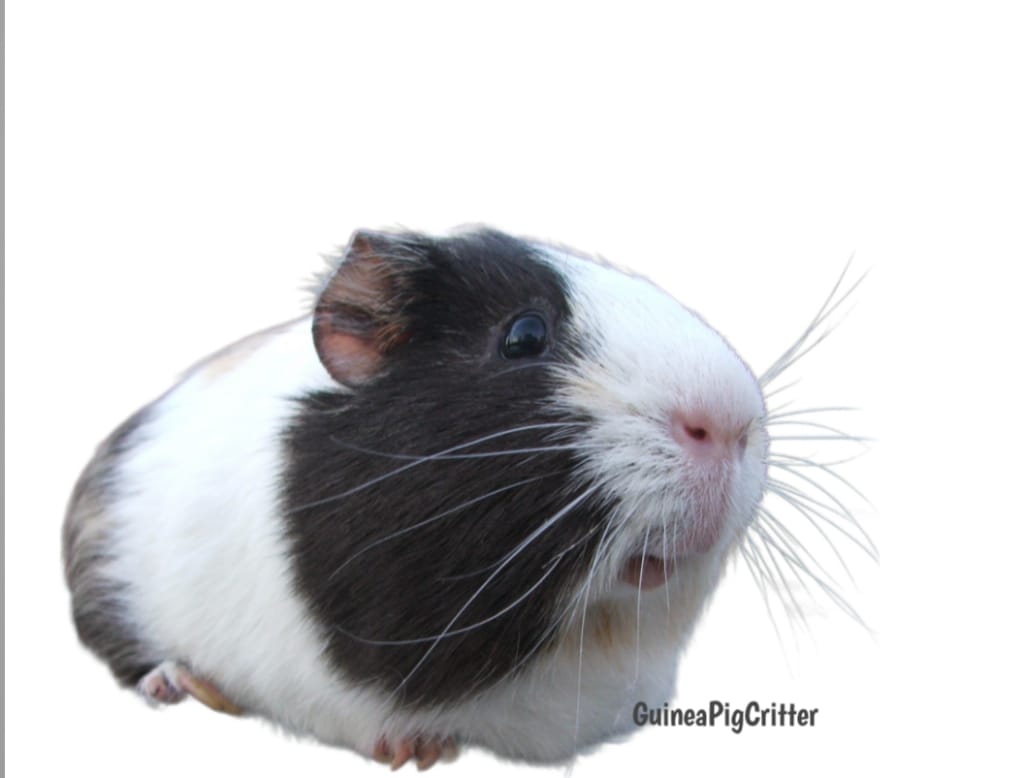
Social Interaction and Bonding
Seeking Attention
Guinea pigs are inherently social beings; therefore, a happy one will actively seek out interaction with both humankind as well as its own kind. Their social behavior is a good indicator of how healthy they are. So if you have a guinea pig that likes spending time with you and interacts positively with others in his surroundings then most likely you have yourself a happy contented pet.
Things to Watch out for:
Attention Seeking: Your guinea pig should approach you, nuzzle your hand or follow you around in its enclosure; this means that it is comfortable and likes your company.
Positive Interaction with Other Guinea Pigs: Observe how your guinea pigs interact if you have more than one. Contented guinea pigs will groom each other, cuddle up close together and play games. Healthy social relationships are a sign of happiness.
Comfortable With Handling: When they enjoy being carried, hugged or seated on laps without showing any signs of stress, signifies that the animal is well-adjusted and happy.
Social Bonding Tips:
Daily Interactions: Spend quality time with your guinea pig daily. Light petting, talking to them as well as handling will create a great bond and make them happier.
Companionship: If possible, house a compatible companion with your guinea pig for socialization purposes and prevention of loneliness. Gradual introductions should be done under supervision to prevent fights.
Patience And Consistency: Build trust by interacting consistently with positivity. Be tolerant as they may either be shy or new to unfamiliar territory.
Guinea pigs’ body language is a powerful indicator of their emotional state. They also exhibit relaxed and comfortable body language when they are happy. To start, keenly observing the physical gestures and postures can help you determine how it feels or if it is living in a stress-free environment.
What to Look For:
Lying Down Comfortably: A guinea pig that spreads itself out on its side or lie on its belly shows that they are at ease and relaxed. Such posture implies the environment is safe for them.
Stretching: Guinea pigs stretch occasionally because it makes them feel good and comfortable. Stretching might happen after a nap or as they wake up from sleep when everything seems right.
Soft Eyes and Ears: When eyes are still, half-closed, ears not pinned back then it means they have found peace within themselves. Stretched or alert eyes with perked ears may signal unease or anxiety.
Tips for Promoting Relaxation:
Create a Peaceful Environment: Make sure your guinea pig’s home is calm without any sudden noises of interruptions. Calm environments encourage relaxation and happiness.
Comfortable Housing: A snug and safe dwelling can be availed to your guinea pig in which it may relax and retreat. Use some fluffy littered bedding and include some hides for letting it be more comfortable.
Gentle Handling: When handling your guinea pig, try to do it with care and avoid doing anything that could stress it. Respect its limits as an individual, let them come close whenever they feel like.
Check this post:-can guinea pig and rabbit live together?
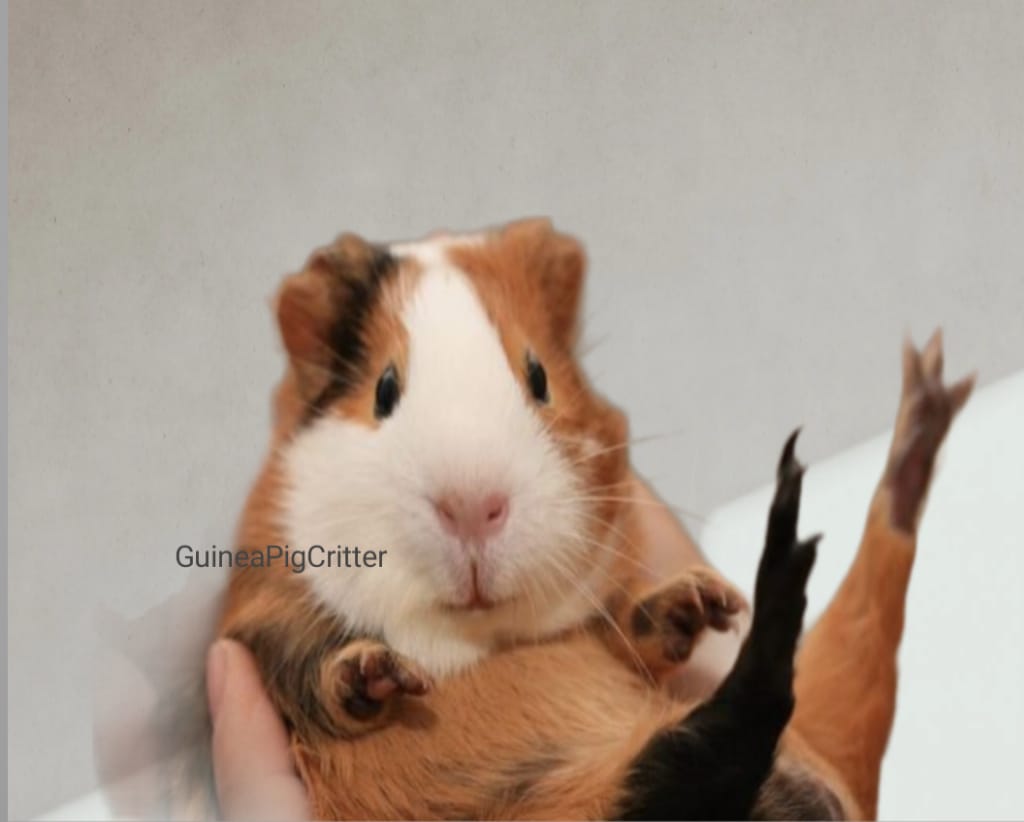
Frequently Asked Questions (FAQs)
How can I make my guinea pig happier?
In order to make your guinea pig happy, provide a large enriched living area, give them a balanced diet and spend quality time interacting with them. Their happiness depends on regular social interaction through playtime.
What are the signs of an unhappy guinea pig?
Signs of unhappiness in a Guinea Pig may include loss of appetite, aggression, lethargy, extreme hiding or no interest in playing or socializing with mates. If you see these indicators evaluate their environment also get advice from a veterinarian if needed.
Can guinea pigs get bored or lonely?
Yes guinea pigs can get bored or lonely especially if kept alone without any form of stimulation. Providing toys, companionship (if possible), and even another healthy guinea pig for company can help minimize boredom or loneliness.
How can I improve my guinea pig’s welfare?
Improve your guinea pigs health by creating a clean and wide living space, providing balanced food, taking them to the veterinary office once in a while and giving them opportunities for play and socialization. It is important to give them safe and comfortable surroundings that meet both their physical as well as emotional needs.
What should be done if my guinea pig does not appear happy?
Check on your pet’s home conditions, diet and interaction with others in case it is not showing any signs of happiness. Make necessary improvements to enhance their environment and schedule. Otherwise, contact an expert of pets’ health care who will help you find out if it has any health problems.
Conclusion
The knowledge of a happy one is important to offer the best care possible and ensure its wellbeing. These include activities they engage in including feeding, vocalizations, social interactions as well as how they carry themselves around with other animals or human beings for instance through either using both eyes instead of just one when moving around some places; eating regular meals at certain times each day or never eating them until later time after work…etc. such signs may indicate happiness or lack thereof so we adjust accordingly where necessary .
Each cavy differs from another; therefore understanding individual choices and actions will go along way towards developing a caring home. Remember that if your pet is happy then it would be healthy this means always looking at what it needs so that you can make sure that there are plenty things about life being enjoyed by furry friend too including all those little things like giving treats during meal time which could really make difference between an unhappy guinea pigs living full joyous existence among us humans who love him/her unconditionally no matter what happens next moment because ultimately theirs should always be safe place even though no longer reality this world today holds up many surprises us sometimes!
